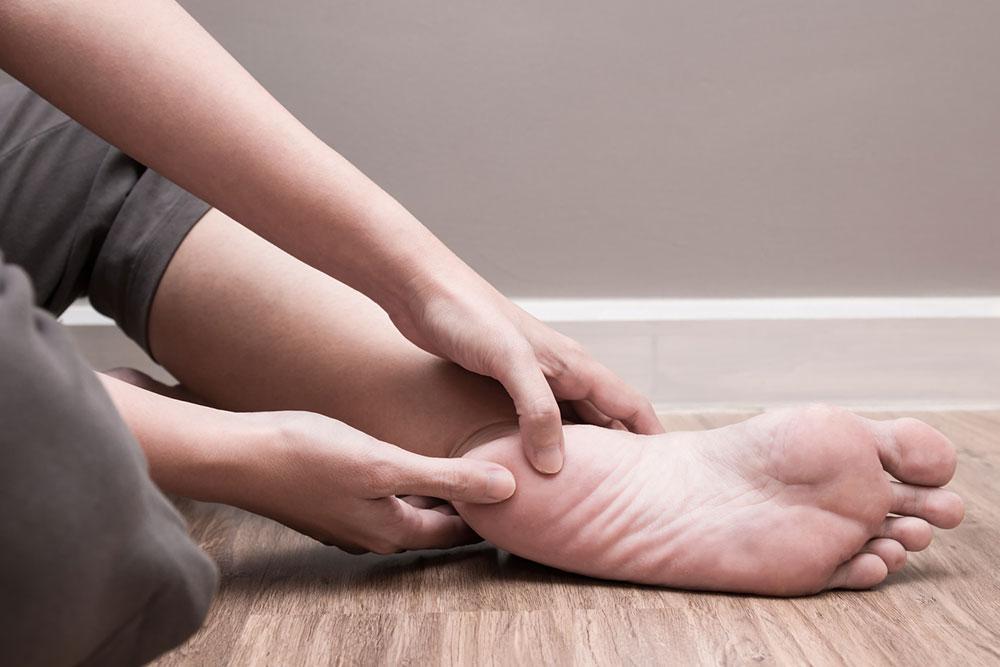Types and Causes of Foot Pain
The problem of foot pain is very common. A research pointed out that foot pain affects 17% to 42% of adults at some time in their life.
This pain in the foot can be caused due to a variety of factors, and sometimes, it gets difficult for the doctors as well to find out the root cause of the pain.
Moving on, foot pain can be extremely agonizing and has a huge impact on the quality of life of a person.

Plantar fasciitis
Most experience heel pain at some point in their life. There may be several causes for this, but the most common cause is plantar fasciitis.
The plantar fascia is a band of connective tissues that run through the entire foot sole and provide shock absorption capability to the foot. In case this tissue attaches to the heel bone, it causes inflammation and pain.
The pain caused due to this is very intense when a person gets out of the bed after a long duration of rest. The pain gets a little better with movement; however, it doesn’t completely go away.
Tarsal tunnel syndrome
This is another type of foot pain caused by an irritated or pinched nerve. It often causes symptoms such as a sharp, burning or shooting pain along with tingling or numbness in the foot. The pain generally radiates from the inside of the ankle and causes foot pain. Top of the foot gets affected, and also, the pain tends to worsen at night.
Metatarsalgia
Metatarsal bones are found in the ball of the foot, which gives it a rounded shape. If these bones get inflamed, it results in a sharp pain in the area, known as metatarsalgia. In this, the person feels like one is stepping on a sharp object. The pain can be eased by sitting down and worsens as the person stands or walks. This condition can be caused by a variety of factors such as faulty foot functioning, excessive fatigue, etc.
Morton neuroma
Morton neuroma is a nerve problem within the foot that results in a shooting and aching pain between the toes. Generally, this pain occurs between the third and fourth toes. Wearing tight and uncomfortable shoes can lead to this condition. Besides, overpronation has also been linked to this ailment.
Tendonitis
Tendons are small cord-like structures that help in attaching muscles to the bone. When these tendons are over-stretched, they can cause pain. This condition is known as tendonitis. Mostly, the affected tendon becomes sensitive to touch and causes pain while undertaking any activity. If the tendonitis occurs frequently, this may be a sign that the tendons have torn or become weak.
Extensor tendonitis is a specific type of tendonitis, usually caused by foot overuse or tight/ill-fitting shoes. It results in the inflammation of the tendons running in the top area of the foot, resulting in excessive foot pain. Top of the foot gets affected here.
Sinus tarsi syndrome
Sinus tarsi is the channel found between the bone of the ankle and the heel. If this channel gets inflamed, it causes excessive foot pain. Top of foot and outer side of the ankle get affected. This is a rare type of foot pain.
In most cases, sinus tarsi syndrome occurs after a traumatic foot injury to the ankle. Besides, it may also occur if a person has a pesplanus/overpronated foot that results in compression in the sinus tarsi.
Arthritis
Arthritis is a condition that arises from the breakdown of cartilage present within the joint, mostly due to physical labor. The damage in the joint manifests in the form of worn cartilage or bone spurs surrounding the affected joint. This can cause a lot of stress and foot pain. Top of the foot gets affected in this.
Few other forms of arthritis that also cause foot pain include gout, lupus, psoriatic arthritis, and rheumatoid arthritis. Common symptoms of this pain include swelling and stiffness and a grinding sound or sensation. Arthritis pain often worsens with exercise.
Ingrown toenails
Ingrown toenails occur when the edge of a toenail grows into the skin. It is generally caused by the pressure of the shoe, resulting in the big toenail cutting into the skin. Symptoms of this include red and swollen skin in the surrounding area, which can often cause an infection. Even the slightest amount of ingrowing can cause an excruciating pain.
Foot pain, especially foot pain, top of the foot being affected, can be very piercing. It is important to see a doctor for an appropriate evaluation so that one can begin with the right treatment plan and get back to the normal activities.